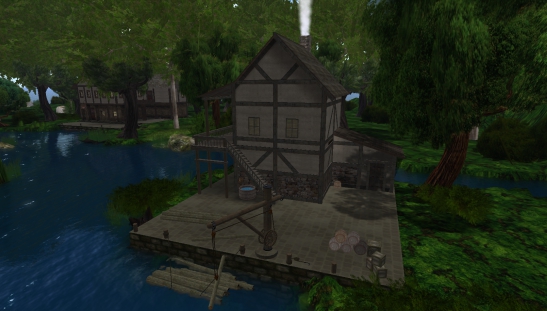I hate that sinking feeling in the pit of the stomach when I know something has been lost that I care about.
After my initial shock of hearing that Linden Labs was dropping education discounts, I immediately communicated with colleagues (most of whom I have never met in person) about “what will we do?†Hand wringing. Then during the day today, Maria Korolov, from Trombly International, asked me a simple question in an email — “Do you think the Lindens are doing the right thing here?†– and that question ignited a spark that I think will grow like a California brushfire.
That is simply because it was clear to me that it didn’t matter – this was no longer about Linden Lab. Yes, I am very disappointed that I will have to front-up to the University and tell them I have invested precious capital budget in a failed project. However, while we were working in Second Life, we also mounted four inexpensive servers to run OpenSim, and to experiment with our own service provision. We have migrated content – and recreated it where necessary – from SL to our OpenSim world. We have 14 sims running, with 28,000 prims on each, and we have a few very talented developers who bring textures, sculpties, and scripting into our new world. And we are not alone.
Working with the University of Otago, the University of Canterbury and other Universities and Polytechnics in New Zealand, we have established the New Zealand Virtual World Grid – a hypergrid arrangement that allows us each to run our own installations – and we subsequently connected to Montclair State University and Clemson University grid in the United States. It is that development that leads me to confidently say, “It doesn’t matter, it is no longer about Linden Lab.”
Three key drivers about Second Life
First and most important, we found in Second Life an environment where colleagues from around the globe could meet, interact, and form relationships. Anyone who has experienced this knows… it is real. It is not video conferencing; it is a tangible sense of presence, co-location, and self.
Second, we discovered a rich resource-base from which we could draw to realize creative and novel developments. Textures, objects, sculpties, scripts and landforms all summed to give us remarkable creative potential.
Thirdly, we found we could leverage the creative genius of our colleagues, bringing our students into worlds that we ourselves never imagined. A walk through the human heart, or a nightmare journey through a disturbed mind…. all safely conducted. This was an open world (mostly) that afforded us the opportunity to share.

The way forward
So, if we are to be successful in migrating out of Second Life, we likely will have to meet the three needs above. If we can, we no longer need Linden Labs. We simple need each other. Here are the steps by which I think we can advance:
- Expand the international Virtual World Grid. This is not a dream, we have already established the base. Several universities, along with commercial grid owners such as ReactionGrid are standing by to assist. This is not difficult to do, and requires only modest resources — considerably less than the cost of Second Life. Connecting the nodes of the grid, we once again gain access to our international colleagues, students and resource bases.
- Migrate as many resources as possible to our OpenSim installations, and share those through Creative Commons licensing. Our education communities have some of the most creative developers in Second Life, and there is little doubt we can migrate their work to form a viable resource base of objects, textures, and scripts.
- Establish federated authentication and authorisation (eg Shibboleth) that will allow us to come together securely. Successful models are already in operation.
In the final analysis we will all have to tally the score, loss or gain. It is my view that the latter will prevail, and that if we simply have the will to take the next steps we can liberate our efforts for the longer term benefits of Education across the globe. Pretty lofty.
- Education Discounts in Second Life: Loss or gain? - October 5, 2010
